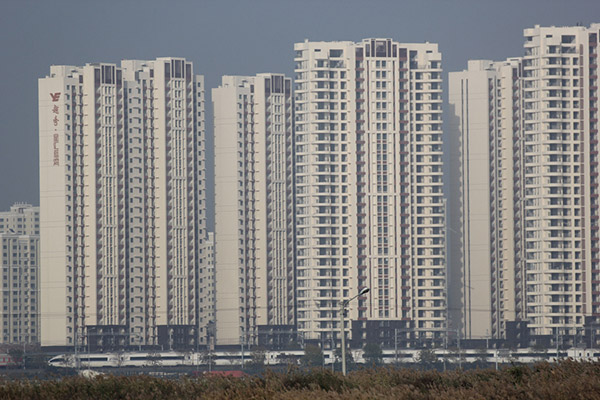A novel way of cooling the housing market
 |
|
A housing project in Qingdao, Shandong province. [Photo/VCG] |
President Xi Jinping has said "houses are built to be lived in, not for speculation". In this context, the pilot for joint property rights housing implemented by Beijing Municipal Commission of Housing and Urban Rural Development is an important move to cool down the heated housing market in the capital.
According to a document, the government and the homebuyers will jointly own the policy-based housing units, with the government granting the buyers the right to use the property.
Since the Beijing municipal government will provide policy support for the construction of joint property rights housing, the price of such housing units will be lower than commercial property in the same neighborhood. However, the homebuyers' right to use the property will be partly restricted.
Different from economically affordable housing, joint property rights housing is a kind of limited property rights housing, because the government provides subsidy in order to lower property prices and reduce homebuyers' economic burden. Also, the government and homebuyers will share the incremental profit of land and housing, as well as the risk of asset depreciation.
By funding the joint property rights housing, the government will eliminate the aspect of profit, which in turn will largely curb speculation. Despite enjoying only partial property rights, the homebuyers have the complete right of use. In fact, they could eventually enjoy full property rights after purchasing the partial property rights from the government. In a way, the government is helping potential property buyers to purchase a house "on installment".
Joint property rights housing may not attract many homebuyers in the short term, because those homebuyers who have enough funds would prefer to purchase commercial housing units, so as to enjoy "full ownership" of the property. But as the supply of joint property rights housing gradually increases, it will check the rise in housing prices, and eventually have an impact on the entire real estate market.
In first-tier cities such as Beijing, a large group of people cannot afford to buy commercial property, but at the same time they are not eligible to apply for public rental housing. Joint property rights housing, to a large extent, will help meet this group's housing need.
In the initial stage of providing public rental housing for those in need, the government focused on solving the housing problem of low-and middle-income people by mainly promoting house leasing. In the middle and later stages, the government jointly promoted the leasing and selling of houses.
The joint property rights housing policy, for the first time, explains in details the sharing of housing property rights between the government and the homebuyers. Thus the resultant market demand will provide a stable source of capital for building joint property rights housing.
And those who buy joint property rights housing can "transfer" their "property" five years after purchasing them according to the prevailing market housing prices at the time, which means policy-based housing can turn into commercial housing. This is not only conducive to making joint property rights housing more attractive to buyers, but also may change homebuyers' expectations.
Moreover, joint property rights housing reflects the significant change in China's real estate policy. In the future, joint property rights housing may integrate various kinds of policy-based housing and security housing for sale, in order to promote more fair and reasonable distribution of security housing, and eventually improve people's livelihoods and regulate the property market.
A series of policies aimed at the property market is expected to be issued soon. Under such circumstances, the environment and operation mechanism of the real estate market could drastically change. As a result, more people would be eager to rent, instead of buying, a house in the future. Generally speaking, more potential homebuyers might prefer adopting a wait-and-see approach after the launch of joint property rights housing, and housing prices are likely to stabilize when the supply of joint property rights housing increases.
The author is a researcher at the Institute for Urban and Environmental Studies, Chinese Academy of Social Sciences.





















